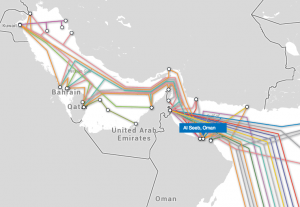Those Cable Landings Chelsea Manning Didn’t Leak
 Yesterday, The Register published what it claims is the story that led GCHQ to destroy the Guardian’s hard drives: the location of a key GCHQ base in the Middle East and its relationships with British Telecom and Vodaphone.
Yesterday, The Register published what it claims is the story that led GCHQ to destroy the Guardian’s hard drives: the location of a key GCHQ base in the Middle East and its relationships with British Telecom and Vodaphone.
While the BT/Vodaphone details are worth clicking through to read, I’m particularly interested in the focus on the base in Oman. (See an interactive map of the cable landings here.)
The secret British spy base is part of a programme codenamed “CIRCUIT” and also referred to as Overseas Processing Centre 1 (OPC-1). It is located at Seeb, on the northern coast of Oman, where it taps in to various undersea cables passing through the Strait of Hormuz into the Persian/Arabian Gulf. Seeb is one of a three site GCHQ network in Oman, at locations codenamed “TIMPANI”, “GUITAR” and “CLARINET”. TIMPANI, near the Strait of Hormuz, can monitor Iraqi communications. CLARINET, in the south of Oman, is strategically close to Yemen.
British national telco BT, referred to within GCHQ and the American NSA under the ultra-classified codename “REMEDY”, and Vodafone Cable (which owns the former Cable & Wireless company, aka “GERONTIC”) are the two top earners of secret GCHQ payments running into tens of millions of pounds annually.
The Brits would have you believe — and I have no reason to doubt them — that this cable landing in Oman is one of the key points in their surveillance infrastructure.
I raise this because of a cable listing the globe’s critical infrastructure — and fearmongering surrounding it — that Chelsea Manning leaked to Wikileaks. As I noted at the time, while the cable lists a slew of cable landings as critical infrastructure sites — including the Hibernia Atlantic undersea cable landing in Dublin, which gets mentioned in the Register story — it does not list a single cable landing site in the Middle East.
NEAR/MIDDLE EAST
Djibouti:
Bab al-Mendeb: Shipping lane is a critical supply chain nodeEgypt:
‘Ayn Sukhnah-SuMEd Receiving Import Terminal
‘Sidi Kurayr-SuMed Offloading Export Terminal
Suez CanalIran:
Strait of Hormuz
Khark (Kharg) Island Sea Island Export Terminal
Khark Island T-JettyIraq:
Al-Basrah Oil TerminalIsrael:
Rafael Ordnance Systems Division, Haifa, Israel: Critical to Sensor Fused Weapons (SFW), Wind Corrected Munitions Dispensers (WCMD), Tail Kits, and batteriesKuwait:
Mina’ al Ahmadi Export TerminalMorocco:
Strait of Gibraltar
Maghreb-Europe (GME) gas pipeline, MoroccoOman:
Strait of HormuzQatar:
Ras Laffan Industrial Center: By 2012 Qatar will be the largest source of imported LNG to U.S.Saudi Arabia:
Abqaiq Processing Center: Largest crude oil processing and stabilization plant in the world
Al Ju’aymah Export Terminal: Part of the Ras Tanura complex
As Saffaniyah Processing Center
Qatif Pipeline Junction
Ras at Tanaqib Processing Center
Ras Tanura Export Terminal
Shaybah Central Gas-oil Separation PlantTunisia:
Trans-Med Gas PipelineUnited Arab Emirates (UAE):
Das Island Export Terminal
Jabal Zannah Export Terminal
Strait of HormuzYemen:
Bab al-Mendeb: Shipping lane is a critical supply chain node
Note, Bahamas’ telecom, which recent reporting has also noted is critical to NSA’s spying, also gets no mention.
That’s not surprising in the least. The cable (and the list) is classified Secret. NSA and GCHQ’s prime collection points are (as the Register notes) classified several levels above Top Secret.
And while the list provided some indication of what sites were significant by their absence, it’s likely that the sites that were listed were the relatively unimportant sites.
At trial, Manning’s lawyers repeatedly point out that she had chosen not to leak stuff from JWICS, which would be classified at a higher level. The stuff she leaked, which she got on SIPRNET, was by definition less sensitive stuff.
I don’t mean to suggest this reflects on the relative value of what either Edward Snowden or Chelsea Manning leaked. I think it is a good indication, though, of how unfounded a lot of the fear mongering surrounding this particular leaked cable was.
